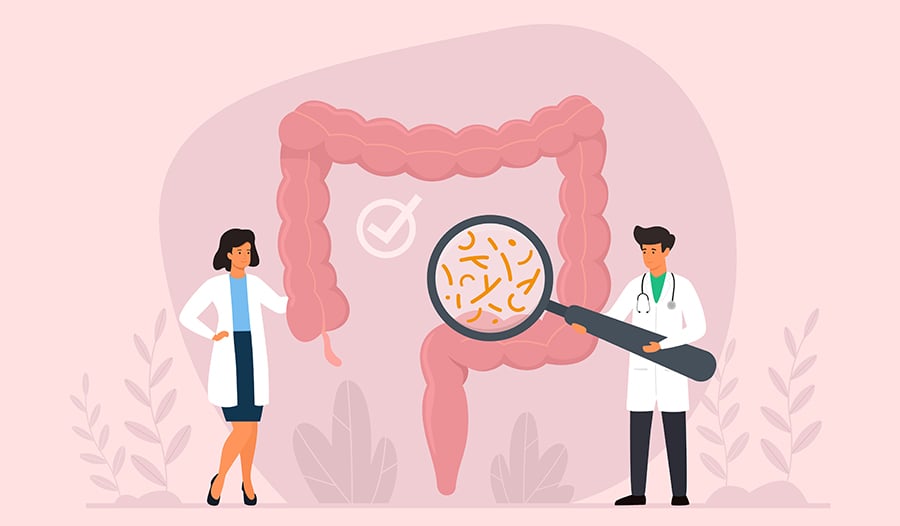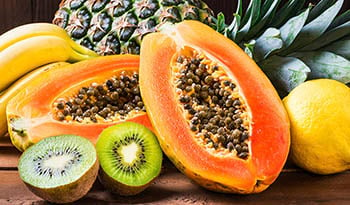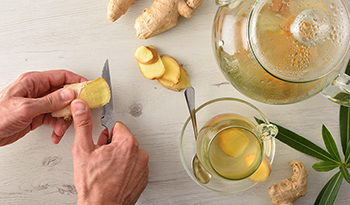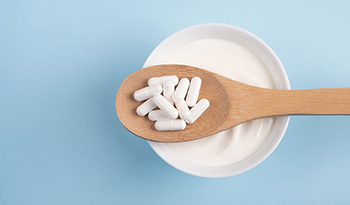How To Treat SIBO Naturally

How to Treat SIBO Without Antibiotics
Small Intestinal Bacterial Overgrowth, also known as SIBO, occurs when there is excessive overgrowth of bacteria in the small intestine. The conventional approach to treating SIBO involves taking antibiotics. Depending on the type of gas-producing bacteria present, standard antibiotic treatment for SIBO may include rifaximin, neomycin, and/or metronidazole.
However, antibiotics are not the only treatment option for SIBO, and some individuals may wish to treat SIBO naturally with antimicrobial herbs. Read on for everything you need to know about SIBO, its causes, and natural treatment alternatives to restore your gut health.
What Is SIBO?
Small Intestinal Bacterial Overgrowth (SIBO) is defined as the presence of excess bacteria in the small bowel. The small intestine should host very little bacteria compared to the large intestine, which is home to most of the bacteria living in your body. Overgrowth of bacteria in the small intestine can lead to negative health outcomes, including SIBO, poor digestion, and malnutrition.1
Overgrowth of bacteria in the small intestine causes dysbiosis, an imbalance in the gut microorganisms. As a result, bacteria in the small intestine digest carbohydrates, producing gas that may lead to bloating, flatulence, constipation, diarrhea, nausea, and other symptoms.
The three main gases produced by SIBO include hydrogen, methane, and hydrogen sulfide. Typically, one gas is dominant in SIBO. However, a person may have all three:
- Hydrogen-dominant: This most common type of SIBO occurs when there is an overgrowth of bacteria that produce hydrogen gas. Hydrogen-dominant symptoms can include bloating and diarrhea.
- Methane-dominant: Occurs when there is an overgrowth of bacteria that produce methane gas. Methane-dominant symptoms can include constipation and bloating.
- Hydrogen sulfide-dominant: Occurs when there is an overgrowth of bacteria that produce hydrogen sulfide gas. Hydrogen sulfide symptoms can include foul-smelling gas and diarrhea.
SIBO Symptoms
SIBO symptoms vary depending on the type of dominant gas present and the longevity of SIBO overgrowth. Common SIBO symptoms include:
- Bloating
- Excessive foul-smelling gas
- Fatty stools
- Abdominal fullness after eating
- Abdominal pain
- Nausea
- Diarrhea, often watery
- Loss of appetite
- Unintentional weight loss
How to Diagnose SIBO
Symptoms may be the first indication that a person has SIBO and the catalyst to see a physician for further testing. While a stool test can help identify gut dysbiosis and other imbalances within the digestive system, it is not an accurate way to diagnose SIBO. This is because stool samples often reflect the health of the large intestine, and SIBO occurs in the small intestine.
The best measure for diagnosing SIBO is a non-invasive home breath test. It measures the amount of hydrogen, methane, and hydrogen sulfide in your gut. Test instructions vary depending on the test and test provider. However, the following preparation and sample collection instructions are typical for SIBO tests.
- 7 days before collection: Stop taking any motility drugs or laxatives.
- 24 hours before collection: Avoid fermentable foods like complex carbohydrates. Follow a strict diet of only meat, tofu, eggs, and white rice for the 24 hours leading up to collection. Limit seasonings to oils, salt, and pepper. Beverages can include coffee, water, or tea without dairy or sugar added.
- 8 to 12 hours before collection: Fast from all food. You may consume water during this time.
- Collection day: Collect your breath samples first thing in the morning after fasting overnight. You will consume a glucose or lactulose solution as part of the collection process. Follow the test instructions for collecting your breath samples, including the quantity and duration of breath samples needed. Typically, a total of eight to 10 samples are collected. You’ll start with a baseline sample, then drink the glucose or lactulose solution. The remaining breath samples are collected at timed intervals over two to four hours. You will fast during the collection process. Once the test is complete, you may return to eating and drinking your regular diet.
- Submitting samples: Refer to your test instruction manual for steps to properly ship and mail your breath test samples.
While the information above provides a general outline of what to expect with a SIBO breath test, always refer to your personal test collection instructions before taking your breath test.
The Root Cause of SIBO
SIBO is a sign that gut health needs to be addressed on a wider scale. SIBO may develop for various reasons, including but not limited to the following:
- Excessive or chronic alcohol intake
- Frequent antibiotic use
- Hypothyroidism
- Surgeries like gastric bypass or gastrectomy, which can create a blockage in the small intestine
- Infections
- Food poisoning
SIBO can also develop from digestive issues like:
- Slow motility from a weakened migrating motor complex
- Lack of bile production
- Insufficient stomach acid
- Leaky gut syndrome or intestinal permeability
Effectively treating SIBO involves evaluating a person’s overall health and addressing other imbalances or conditions.
How to Naturally Treat SIBO
SIBO cannot be treated through dietary changes alone. When unwanted bacteria have proliferated in the gut, those bacteria need to be killed and cleared out. The conventional SIBO treatment approach does this with antibiotics. However, natural antimicrobials like oregano oil, berberine, and allicin offer an alternative approach to ridding the gut of bacterial overgrowth.
The type, quantity, and duration of antimicrobials used depend on the dominant gas type present. In addition to killing the bacterial overgrowth, following a modified diet can help reduce SIBO symptoms, starve the bacteria from further growth, and restore gut health.
A general 3-step treatment plan for SIBO includes the following:
- Starve the bacteria with the low FODMAP diet
- Kill the bacteria using antimicrobials
- Restore gut health through diet, herbs, and lifestyle changes
What Is the Low FODMAP Diet?
The Low FODMAP Diet is a short-term elimination diet. It involves avoiding high FODMAP foods to help identify triggering foods, manage digestive distress, and relieve symptoms of irritable bowel syndrome (IBS) and SIBO. FODMAP stands for fermentable oligosaccharides, disaccharides, monosaccharides, and polyols.
High FODMAP foods can include but are not limited to:
- Grains: wheat, rye
- Fruit: apple, pear, watermelon
- Vegetables: onion, garlic, leek, cauliflower, most mushrooms
- Dairy: milk and most milk products
- Legumes: most beans
Following a low FODMAP diet during a SIBO treatment protocol can help starve the unwanted bacteria and reduce SIBO symptoms. While following a low FODMAP diet can benefit those with SIBO symptoms like gas and bloating, it alone will not fully eradicate the overgrowth of bacteria in the small intestine, so an antimicrobial treatment plan is necessary.
Natural SIBO Treatment Supplements
Biofilm Disrupters
Many bacteria form a protective layer around themselves known as a biofilm, which makes them more resistant to antibiotics and antimicrobials. Biofilm disrupters taken one to two weeks before starting antimicrobial treatment help break down the biofilm, making bacteria more susceptible to treatment. Biofilm disruptors include supplement forms of garlic, oregano oil, N-acetylcysteine (NAC), and naturally formulated biofilm-disrupting supplements.
Antimicrobials
Antimicrobials are natural substances that kill microorganisms or prevent their growth. They can be introduced one to two weeks after taking a biofilm disruptor.
- Berberine: Berberine is an herbal antimicrobial for treating hydrogen or hydrogen-sulfide-dominant SIBO.
- Oregano: Oil of Oregano is a powerful herbal antibiotic with antifungal, antiviral, and antimicrobial properties. It is typically consumed for two to six weeks to help treat hydrogen or hydrogen sulfide-dominant SIBO. Side effects of taking oregano oil may include nausea and gastric distress.
- Allicin: Allicin is the main active compound found in garlic. It has antimicrobial benefits that help the body fight against bacterial overgrowth. Allicin can be very effective for treating methane-dominant SIBO.
Before taking an antimicrobial for SIBO, consult your healthcare provider to determine the ideal dose and duration of treatment for supporting your gut microbiome.
Prokinetics
A prokinetic supplement is designed to increase peristalsis, or the contractions of the gastrointestinal tract muscles. These supplements support the migrating motor complex (MMC), a series of contractions that help move food through the digestive tract. The MMC is like a broom that helps sweep the GI tract, moving food along, which typically takes 90 minutes to three hours to complete.
With SIBO, the MMC can weaken, resulting in food and bacteria remaining in the intestines longer. Prokinetic supplements include artichoke leaf extract and ginger root extract. Additional herbs that may help include licorice, marshmallow root, and slippery elm.
Repair Your Gut Health
Completing a breath test following a four-to-six-week SIBO protocol can measure the amount of fermented gasses present after treatment. While no cure for SIBO exists—once a person has SIBO, some level of bacteria will always reside in the intestines—it is possible to be in remission from SIBO. Good gut health is essential for long-term remission from SIBO. Healthy habits to support gut health include:
- Manage and reduce stress: Chronic stress negatively impacts gut health and increases inflammation, potentially leading to leaky gut syndrome, altered gut bacteria, and digestive issues like diarrhea, nausea, gas, upset stomach, and more. Implementing daily stress management habits, including movement, time in nature, adequate sleep, or engaging in a calming hobby like reading, drawing, or crafting, supports the nervous system and can improve the body’s stress response.
- Prokinetics: Continue taking prokinetic supplements for at least three months following a SIBO protocol to strengthen and support the MMC.
- Fermented foods: Fermented foods, such as sauerkraut, kombucha, and kimchi, naturally contain probiotics that support gut health.
- Probiotics: Probiotics are beneficial bacteria that reside in your gut, improving gut health and imparting other health benefits.2 You can help populate your gut with these friendly bacteria by eating probiotic-rich foods or taking a probiotic supplement.
- Prebiotics: Prebiotics feed the good bacteria in your gut, strengthening and supporting their growth. Prebiotics include certain types of fiber and are found in foods like onions, asparagus, garlic, chicory, Jerusalem artichoke, oats, and wheat.
- Movement: Studies show regular movement and exercise not only help lower stress, but also support bacterial diversity in the gut!3
- Sleep: During sleep, the body rests, repairs, and heals. Aim for seven to eight hours of uninterrupted sleep per night for optimal gut health.
- Best foods for gut health: An anti-inflammatory, fiber-rich, whole foods diet is best for supporting gut health. Minimize your consumption of processed and packaged foods, focusing instead on whole foods like fruits, vegetables, nuts & seeds, whole grains, legumes, quality animal proteins, herbs & spices, and fermented foods. Nutrition is not one-size-fits-all—each person may need to tailor their diet based on their preferences and gut health needs while taking any allergies or food sensitivities into consideration.
- Digestive Support: Digestive enzymes or bitter herbs can also support optimal digestion, helping reduce gas, bloating, and digestive distress.
- L-Glutamine: The amino acid L-glutamine may support a healthy gut barrier lining, helping decrease gut permeability and inflammation in the intestinal tract.4
Put SIBO Into Remission Naturally
The overgrowth of bacteria in the small intestine, known as SIBO, can’t be treated through dietary interventions alone. While the standard treatment for SIBO involves antibiotics, natural antimicrobials, like oregano oil, berberine, and allicin, may help rid the gut of bacterial overgrowth and help put SIBO into remission.
A natural protocol for treating SIBO involves a 3-step treatment plan, including starving the bacteria with a low FODMAP diet, killing the bacteria with antimicrobials, and restoring gut health through diet, herbs, and supportive lifestyle changes.
As with all health conditions, it is important to identify and address the underlying causes of SIBO, such as hypothyroidism, a weak MMC, excessive alcohol intake, or certain medications, to help prevent a SIBO relapse. Talk with your healthcare provider if you think you have SIBO to help determine an appropriate and safe treatment for your body.
References:
- Roszkowska P, Klimczak E, Ostrycharz E, et al. Small Intestinal Bacterial Overgrowth (SIBO) and Twelve Groups of Related Diseases—Current State of Knowledge. Biomedicines. 2024;12(5):1030.
- Yadav MK, Kumari I, Singh B, Sharma KK, Tiwari SK. Probiotics, prebiotics and synbiotics: Safe options for next-generation therapeutics. Appl Microbiol Biotechnol. 2022;106(2):505-521.
- Monda V, Villano I, Messina A, et al. Exercise Modifies the Gut Microbiota with Positive Health Effects. Oxid Med Cell Longev. 2017;2017:3831972.
- Kim MH, Kim H. The Roles of Glutamine in the Intestine and Its Implication in Intestinal Diseases. Int J Mol Sci. 2017;18(5).
DISCLAIMER:This Wellness Hub does not intend to provide diagnosis...
















































































 Table of Contents
Table of Contents















